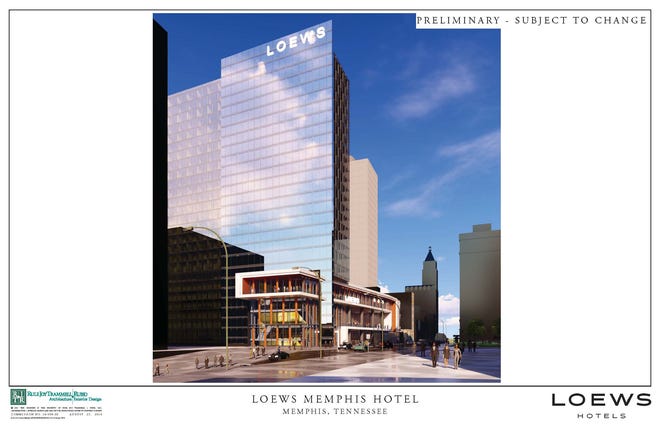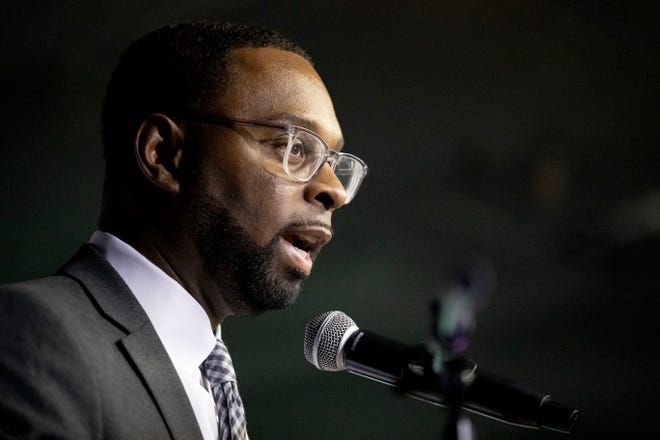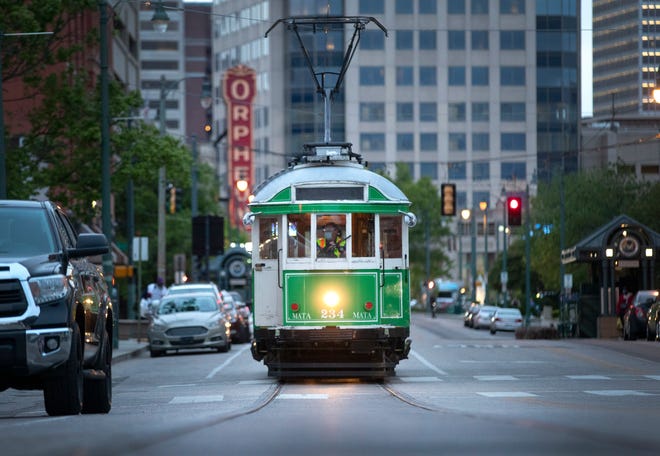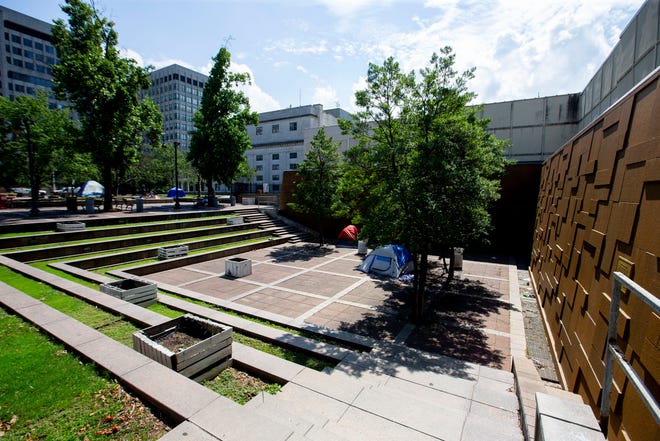Q&A: DMC President Paul Young on Downtown's big projects, grocery stores, pandemic recovery
Courtesy of the Commercial Appeal.
Editor's note: This interview was conducted before Loews said on Monday it was continuing its Downtown Memphis project with a narrower scope.
One month after taking over as president and CEO of the Downtown Memphis Commission, Paul Young sat down with The Commercial Appeal to discuss post-pandemic business recovery in Downtown, his priorities for the organization and the importance of minority contracting on large developments.
Young took over the organization following the departure of Jennifer Oswalt, who remains a contractor for the DMC as she works with the Haslam Family Foundation. Young previously served as director of housing and community development for the city of Memphis. Read the full interview below.
Commercial Appeal: Now, a month in charge of the DMC, how's it going? How was your first month at the helm?
Paul Young: I'm really excited. I've learned a lot and there was a lot that I thought I knew about DMC, but there's a lot more complexity to the programs. So I'm getting initiated into all of those different things, and I'm really excited about the opportunities for Downtown. There are a lot of things that are brewing, and a lot of things that I believe will come to fruition, particularly after we fully come out from the pandemic. But it's a really exciting time for Downtown.
CA: What are some of those things that are brewing that you're most excited about? Any particular projects or areas of Downtown that are getting developed that you're really excited about?
Young: It's projects that have been on the horizon for quite some time, things like The Walk that have been talked about for a number of years, it's getting ready to actually break ground this summer. Projects like the Hyatt Centric, which just opened, and the next hotel, there's gonna be three hotels right there on that site. Hyatt Caption is getting ready, groundbreaking took place about two weeks ago. And so it's those big projects that are continuing to happen.
And then many of our longtime tenants and Downtown, some of the restaurants and bars. Some of them have already opened and some of them are currently making plans to open and working to get staff back up. And so I think over the next couple of months you'll see even more activity Downtown. The last few weeks have been really good, really busy, particularly on the weekends. And so we know that people want to be back Downtown and so we want to make sure that people are able to come and enjoy it safely.
CA: Post pandemic, I use that term and no one really quite knows what it means, but we kind of talked about this return to normal, when do you think Downtown will be back to normal? Will there be lasting effects from the pandemic or do you think in a month or a year Downtown will be like it was in 2019?
Young: It's hard to say what the pandemic will do so I don't want to speak too early. But I do think we are seeing signs of life coming back to Downtown as the vaccination efforts continue to increase locally. I'm hesitant to put a timeline on it, but I do think over the next year you will begin to see Downtown come back to form. And when I say back to form, I mean that's more restaurants opening, that's more people coming back Downtown... that momentum was very evident because of all the things that were opening up and announcements taking place. And the blessing for us is that many of those announcements that were made in previous years, those projects are still underway even though some didn't quite take off during this past year or so that we were in the pandemic.
CA: Can you give us an update on any of those bigger projects that might have been announced a year or two before the pandemic and might have stalled a little bit in the past year? Are there any updates on any of the big projects Downtown that are still ongoing but haven't seen a lot of motion in the past year?
Young: One that has seen motion in the past year is the 100 North Main building. That's one that has recently had a lot of activity. DMC, through our Downtown Mobility Authority, acquired that structure, and we are currently working on a (request for proposals) for developers that might be interested in taking that structure on. We expect to issue that somewhere around June 15.
Projects like Loews Hotel, they're still doing doing their exploration. And so we're really excited that they're still on the horizon. I mentioned The Walk. That's one that will break ground this summer. Those are probably some of the biggest ones. But then I often hear about things like the Brooks Museum. We recently had a meeting with them and they are still doing their work and fundraising and design work to bring that project forth. So Downtown, the future for Downtown, is very, very bright.

CA: How is the DMC going to be different under your tenure than it was under Jennifer Oswalt's? Are there going to be any big changes in priorities or the direction of the organization?
Young: I don't know if there'll be big changes. Some of the things that I definitely want to prioritize are minority spending and engagement. That's something that was a priority under Jennifer and something that will continue with me in this role. And I'm excited about finding more opportunities to get my minority businesses to locate Downtown, to find ways to ensure that minority businesses play a role on the construction side of projects.
And one of the things that I'm really excited about trying to do is figure out how we can even encourage more diversity in developer teams and figure out, how can we build long-term wealth in the African American community from the developer side. That's a little bit more complex, but it is something that we are interested in pushing.
CA: Maybe this is an impossible question to answer in a short interview, but how do you do that?
Young: I think, just by stating it and saying that that's a priority for us and as a city, I think that helps give development teams direction so they can be more intentional about finding minorities that are willing to invest and participate in those projects that are being proposed. That's one way, just creating a narrative that says, "This is what we want." We are authorized to do public incentives.
And so, as an agency there's often a public incentive. We have the onus of responsibility to figure out what's in the public interest, what things do we want the developers to bring us that's going to benefit the city of Memphis and Shelby County and our population and our citizens. So I think the more we can push for these things, while it's difficult to mandate, and the more we can encourage developers to do it, that's one way that we can start moving the needle.

CA: You mentioned the incentives. There have been a couple joint City Council and County Commission meetings talking about incentives particularly (payment-in-lieu-of-tax incentives). Where do you think the conversation around PILOTs needs to go? And do you think the DMC at least... should evaluate the situations (in) which it is giving PILOTs to see if there should be more asked of those developers?
Young: Those conversations were really good. I think it was good for us to have that public dialogue and I think it was informative for our commissioners and councilpersons to participate. In terms of where we go from here, I believe that is something we should constantly monitor and look at and see are our incentives doing what we intend for them to do? One of the things that was pretty well understood after the series of meetings is that there's a difference in the two PILOTs that are being offered by DMC and (the Economic Development and Growth Engine for Memphis and Shelby County).
So on the real estate PILOT, our goal is to try to remediate blight, is to get a structure that would not have previously been renovated to get done, to get it renovated. As we look at that, there is a threshold where an incentive is no longer required, meaning there's an amount of rent that can be charged. And once that rent is high enough, whether it's office, hotel, apartment whatever it is, once that rent is high enough, there's no financial incentive needed because there's no gap. Our market is not there yet, where projects can self-sustain, particularly in Downtown just given the cost. But it is something that we will continue to monitor.
And then the other piece is just thinking about what is the public good that we want to require from the projects that are receiving incentives. That's a process that we have to constantly look at and will work with our boards, Center City Revenue Finance Corporation, and our staff to continue to monitor those programs as we move forward.

CA: Your focus is Downtown. But how can the DMC foster growth Downtown that will lead to growth in other parts of Memphis?
Young: So, Downtown is really the economic heart of our community. So, as we create jobs, we create activity, that does benefit all of the neighborhoods in our community. For instance, if you have a business owner that's looking at moving their business from some other part of the country into Memphis, they're probably going to stay Downtown. They're going to base their perception of the city of Memphis and of the Mid-South region on their experience in Downtown Memphis. And so it's important that we have a high quality space in Downtown.
We also have jobs that are located Downtown. Tourism is a significant sector for our community. We can create job opportunities for those residents that live in the city of Memphis and Shelby County and the region. All of it is really really interconnected. So having a very strong Downtown, it absolutely helps every part of our community.
CA: I did want to go back to one thing we talked about a minute ago you mentioned the Loews Hotel. I know people are very interested in any little update on that. So there is a development agreement with the city, I believe, where does that agreement stand?

Young: I've only had a brief conversation with them in my short time in this role. So my understanding is that they are still doing all of their due diligence. I did have a brief conversation with them. I know that they are still high on Memphis, and they're looking forward to getting into this market. So I think over the coming months we will hear more about that project.
CA: So to your understanding, it's still moving forward just not moving at warp speed?
Young: Right, the pandemic did impact their discussions. But they're definitely still moving forward.
CA: Broadly speaking, what are your short-term goals for Downtown and what are your long-term goals for growth in Downtown?
Young: Short term is pandemic recovery. We want to make sure that we get people safely back Downtown. We want to make sure that Downtown is a safe space. We want to make sure that it's a fun and active space. We want it to reflect the character and makeup of our city. And so we want to help the businesses that are currently located here, we want to provide some programs and incentives that encourage them to stay. They had a tough time over the past year, because, the Downtown businesses, pedestrian traffic is really really important. And it was a time period where people were really staying in their neighborhoods and shopping in their neighborhoods. While sales taxes for all of Shelby County went up, the sales taxes that Downtown Memphis generated actually went down, and that's a result of people not coming Downtown. So, in the short term, we want to make sure we get back down here and we get those businesses stabilized.
In the long term, we want to make sure that we're... creating a space for all. That we've creating a space that reflects the diversity. We want to see our incomes and our community grow as a result of the activities that are taking place Downtown. I know that's a loaded statement. But, that means that as construction jobs and these things are happening with continuing to push the needle on participation as businesses are located Downtown, that we're seeing (a) diverse range of businesses that are located here. All of those are things that we want to make sure that we're pushing in the long term, and we can help our city greatly if we can do that.
CA: We’ve seen a fair amount of residential growth in Downtown, particularly the South Main Arts District area, and there have been announcements about two smaller market-style grocery stores. But should anyone be expecting a big grocery store to come to Downtown anytime soon?
Young: The grocery store has been something that we've talked about in Downtown for quite some time. I do believe that over time it will happen. I don't know that it will happen in the next one to two years. But I think in the next three to five years, it is likely to happen. I just don't know where yet, But it's really exciting that we have seen those smaller grocers come in. It is going to demonstrate that there is a market here, and I truly believe that we will see a larger one, that can ideally coexist with the smaller ones that have been opened up recently.